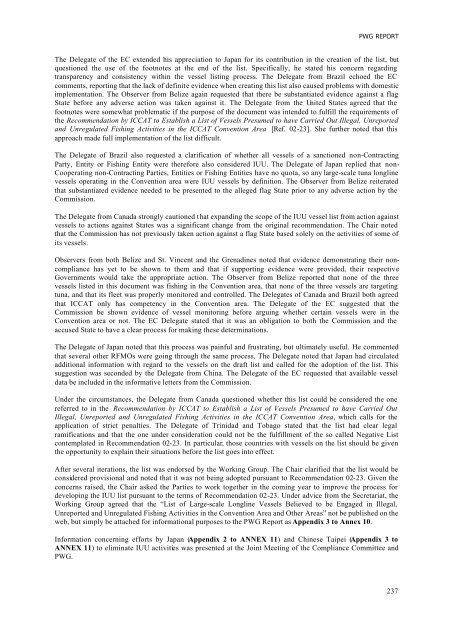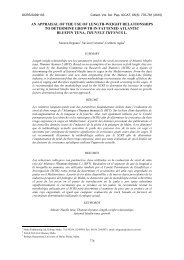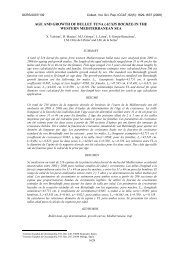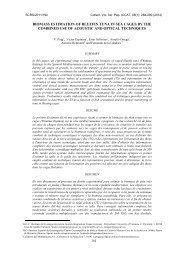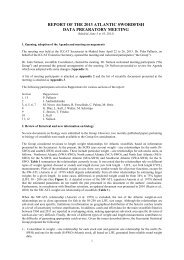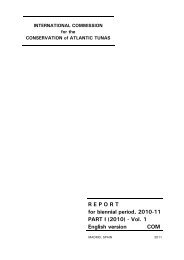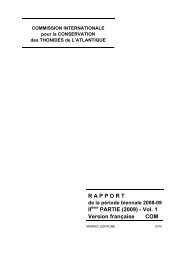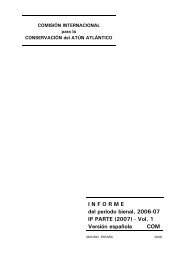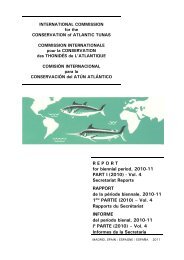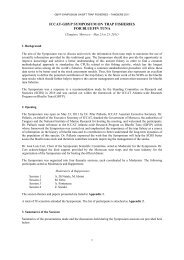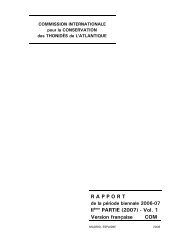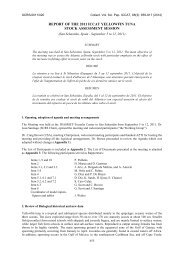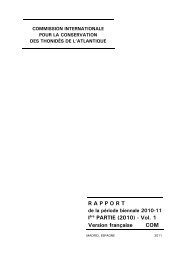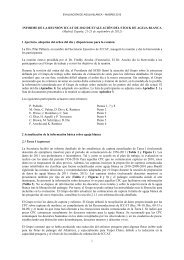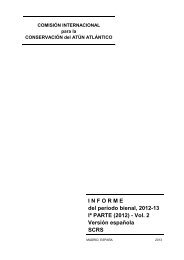E - Iccat
E - Iccat
E - Iccat
You also want an ePaper? Increase the reach of your titles
YUMPU automatically turns print PDFs into web optimized ePapers that Google loves.
PWG REPORT<br />
The Delegate of the EC extended his appreciation to Japan for its contribution in the creation of the list, but<br />
questioned the use of the footnotes at the end of the list. Specifically, he stated his concern regarding<br />
transparency and consistency within the vessel listing process. The Delegate from Brazil echoed the EC<br />
comments, reporting that the lack of definite evidence when creating this list also caused problems with domestic<br />
implementation. The Observer from Belize again requested that there be substantiated evidence against a flag<br />
State before any adverse action was taken against it. The Delegate from the United States agreed that the<br />
footnotes were somewhat problematic if the purpose of the document was intended to fulfill the requirements of<br />
the Recommendation by ICCAT to Establish a List of Vessels Presumed to have Carried Out Illegal, Unreported<br />
and Unregulated Fishing Activities in the ICCAT Convention Area [Ref. 02-23]. She further noted that this<br />
approach made full implementation of the list difficult.<br />
The Delegate of Brazil also requested a clarification of whether all vessels of a sanctioned non-Contracting<br />
Party, Entity or Fishing Entity were therefore also considered IUU. The Delegate of Japan replied that non-<br />
Cooperating non-Contracting Parties, Entities or Fishing Entities have no quota, so any large-scale tuna longline<br />
vessels operating in the Convention area were IUU vessels by definition. The Observer from Belize reiterated<br />
that substantiated evidence needed to be presented to the alleged flag State prior to any adverse action by the<br />
Commission.<br />
The Delegate from Canada strongly cautioned that expanding the scope of the IUU vessel list from action against<br />
vessels to actions against States was a significant change from the original recommendation. The Chair noted<br />
that the Commission has not previously taken action against a flag State based solely on the activities of some of<br />
its vessels.<br />
Observers from both Belize and St. Vincent and the Grenadines noted that evidence demonstrating their noncompliance<br />
has yet to be shown to them and that if supporting evidence were provided, their respective<br />
Governments would take the appropriate action. The Observer from Belize reported that none of the three<br />
vessels listed in this document was fishing in the Convention area, that none of the three vessels are targeting<br />
tuna, and that its fleet was properly monitored and controlled. The Delegates of Canada and Brazil both agreed<br />
that ICCAT only has competency in the Convention area. The Delegate of the EC suggested that the<br />
Commission be shown evidence of vessel monitoring before arguing whether certain vessels were in the<br />
Convention area or not. The EC Delegate stated that it was an obligation to both the Commission and the<br />
accused State to have a clear process for making these determinations.<br />
The Delegate of Japan noted that this process was painful and frustrating, but ultimately useful. He commented<br />
that several other RFMOs were going through the same process. The Delegate noted that Japan had circulated<br />
additional information with regard to the vessels on the draft list and called for the adoption of the list. This<br />
suggestion was seconded by the Delegate from China. The Delegate of the EC requested that available vessel<br />
data be included in the informative letters from the Commission.<br />
Under the circumstances, the Delegate from Canada questioned whether this list could be considered the one<br />
referred to in the Recommendation by ICCAT to Establish a List of Vessels Presumed to have Carried Out<br />
Illegal, Unreported and Unregulated Fishing Activities in the ICCAT Convention Area, which calls for the<br />
application of strict penalties. The Delegate of Trinidad and Tobago stated that the list had clear legal<br />
ramifications and that the one under consideration could not be the fulfillment of the so called Negative List<br />
contemplated in Recommendation 02-23. In particular, those countries with vessels on the list should be given<br />
the opportunity to explain their situations before the list goes into effect.<br />
After several iterations, the list was endorsed by the Working Group. The Chair clarified that the list would be<br />
considered provisional and noted that it was not being adopted pursuant to Recommendation 02-23. Given the<br />
concerns raised, the Chair asked the Parties to work together in the coming year to improve the process for<br />
developing the IUU list pursuant to the terms of Recommendation 02-23. Under advice from the Secretariat, the<br />
Working Group agreed that the “List of Large-scale Longline Vessels Believed to be Engaged in Illegal,<br />
Unreported and Unregulated Fishing Activities in the Convention Area and Other Areas” not be published on the<br />
web, but simply be attached for informational purposes to the PWG Report as Appendix 3 to Annex 10.<br />
Information concerning efforts by Japan (Appendix 2 to ANNEX 11) and Chinese Taipei (Appendix 3 to<br />
ANNEX 11) to eliminate IUU activities was presented at the Joint Meeting of the Compliance Committee and<br />
PWG.<br />
237


